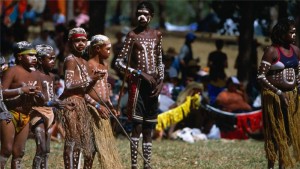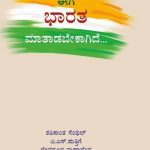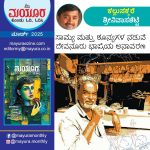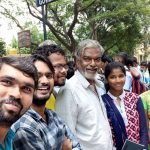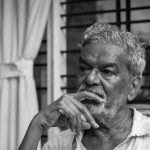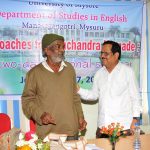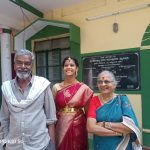Dalits and Aboriginals: Rebuilding India and Australia-Devanuru Mahadeva
[This article by Devanur Mahadeva was translated into English by Sridhara Gowda and published in Al Jazeera News on 2.10.2016.ದೇವನೂರ ಮಹಾದೇವ ಅವರ ಈ ಬರಹವನ್ನುಶ್ರೀಧರ ಗೌಡ ಅವರು ಇಂಗ್ಲಿಷ್ ಗೆ ಅನುವಾದಿಸಿದ್ದು, 2.10.2016 ರಂದು Al Jazeera News ಪತ್ರಿಕೆಯಲ್ಲಿ ಪ್ರಕಟವಾಗಿದೆ.]
www.aljazeera.com/
A Dalit author issues a call to rebuild India and Australia with humanity not discrimination at their core.
When a photograph of me, an Indian Dalit, posing alongside Jeanine Leane, Marie Munkara, Dylan Coleman and Brenton McKenna, descendants of Australia’s early inhabitants, was published, I felt a relationship had been born, although I wasn’t sure if it was intentional or accidental.
It reminded me of an incident experienced by Kannada writer, Vikram Visaji in West Bengal when a young poet, an Adivasi (the indigenous inhabitants of India) from the Santhal tribe, showed him a Bengali translation of my short story Amasa and asked: “Is this writer an adivasi?”
“Not an Adivasi but a Dalit,” Vikram replied.
But the young poet wasn’t convinced. “This Mahadeva is an adivasi. Only an Adivasi can write a story like this. This is my life,” he said.
When Vikram told me this I felt that humanity is connected beyond reason. Don’t we all have the same roots?
I don’t know much about life in Australia or its literature. I have only read the Kannada translation of Rabbit Proof Fence, Oodgeroo Noonuccal’s collection of poems, We Are Going, and a few Aboriginal legends and mythologies.
When well-known poet Kath Walker changed her colonial tainted name to Oodgeroo Noonuccal, an Aboriginal one, this was not a simple act. It is standing proud in her true colours; being born again by shedding the outer scale of the skin.
When strangers meet in India a routine question asked is: “Who are you people?”
What they are actually trying to find out is each other’s caste.
People belonging to another caste are not the same people! Every time I remember this absurdity, I feel sad.
But what is more tragic and abominable is when British sailor Captain James Cook reached Australia in 1770 and declared the land “Terra Nulis”, meaning nobody’s land, ignoring the aboriginals who had lived there for more than 50,000 years.
READ MORE: Australia’s aboriginals – When the river runs dry
To Cook’s European eye, Aboriginals were not even “other” people. This is a terrible and inhumane blindness.
One of Noonuccal’s poems, Protectors, has a painful line that portrays the extreme cruelty and helplessness of humans: “Who move us about at will like cattle.” It could be animals speaking to their owners, if they had a voice.
Continuing on the path of Noonuccal’s poetry, in the narration of Acacia Ridge, there is a line – “Bulldozers huddle the crime aside” – that perfectly describes the insensitivity of colonists who treated Aboriginals like cattle, demolishing their living spaces. I feel this also applies to globalisation today.
“Insult and scorn assail,” she writes in the poem, My Love, and “No abos here” in the poem, Why Not Street, which documents the sad state of affairs for Aboriginals who have no entry to their own land.
In Aboriginal Charter of Rights, she says: “Give us Christ, not crucifixion.” When that is not heard, she continues:
“White fellow, true
You had more for pride:
You had Jesus Christ,
But him you crucified,
And still do.”
And unable to understand the cruelty of the white man says in frustration: “Poor white man of the unhappy race” in the poem The Unhappy race.
In this way, while trying to find the footmarks of history and transition in Australia, through the poetic essence of a sensitive poet, I also become helpless and move on to myths and legends.
I don’t know the origin of this story, maybe it’s the story of every empire. An emperor was on a mission to conquer the entire world and had killed hundreds of thousands of people. He was gloating about his victory when his soldiers brought before him a cannibal they said they had caught moving a slain body to a nearby bush.
“I was hungry sir, took only one,” the poor man said.
The emperor replied: “You can have the rest and enjoy.”
”They are yours, sir. My hunger is not as great as yours,” the poor man responded.
The empire’s or the oppressive ruler’s hunger must be like this.
Australian Aboriginal legend has a mythological creature, Bunyip, which seems to attack women and children and lives in swamps and riverbeds. Like the aboriginals who were oppressed by the Europeans, these serene places lose their peace because of the attacks.
Dawn Wail For The Dead, a poem by Noonuccal, narrates the accumulated pain:
“First thing every dawn
Remember the dead, cry for them
Softly at first her wail begins,
One by one as they wake and hear
Join in the cry, and the whole camp
Wails for the dead, the poor dead”
I wonder if this poem would have been able to say more with the rhythm, the smell and the touch of her aboriginal language if it wasn’t written in English. Would that have been the seed of an epic?
I don’t know. Stone Age, another poem that I like, has an insightful line: “White man, only time is between us.” If we remove the time difference and keep both at the same time as the Aboriginals – we will notice the arrogant white imperialist and the black Aboriginals at that time both searching for food and living in caves.
Also notice that the Stone Age black aboriginals have a treasure trove of wise stories.
One of those stories is about how seven sisters become Pleiades star clusters.
READ MORE: Dalit Muslims of India
In the early days of the human species, seven sisters realised the necessity of the body surrendering to the will of the mind. Surrendering the body is about controlling the consequences of physical pain, hunger and fear.
It is a slap to the face of today’s so-called civilised, who raise children by protecting them from those very things. Seven sisters by obtaining permission from the elders underwent the trial by ordeal and tolerated the hunger, endured the pain and conquered the fear.
They were blessed by the great spirit to become the Pleiades star clusters, to be a shining light and a symbol for their race.
In an African tribe, before marriage a ritual is practised where the naked couple sleep head to head all night so that their minds meet before their bodies. Today’s world is trampling on these extraordinary stories while chasing the body’s desire.
In another aboriginal mythology from Australia, a tortoise which was ignored and ridiculed by other animals saves the entire animal kingdom by its shell. The tortoise should become the totem for Aboriginals, Dalits, people who are being thrown out and for the communities who have been ignored.
In order to survive, ignored communities have to move slowly, withdrawing the head inside when danger beckons. They must secure a shell to protect them from death when beaten. After surviving, the greedy world has to be freed and rescued from its greed. Is it possible to create an epic of our time from a tree originating from the songs, ballads, plays and folklore, in the aboriginal language, using its rhythm, smell and touch and combining the essence of myths and Rabbit Proof Fence kind of experiential tales as the creative source?
A last word: Aboriginals who have been distressed in their own land have not told the recently arrived Europeans who have devastated them: “You have been here only a couple of hundred years. You go back to your country.”
It is time that the outsiders living in Australia become like the aboriginals. Their manifesto “Banish bans and conquer caste” has to be practised. A humane, non-discriminatory and respectful Australia needs to be built with aboriginals at the centre. It is also time to build a new India, as this one is suffering from hunger, humiliation, untouchability and discrimination.
Devanuru Mahadeva delivered the keynote speech in Mysore at the conference ‘After Dreaming: Australian Indigenous Literature Symposium’ attended by Australian aboriginal writers.
The views expressed in this article are the author’s own and do not necessarily reflect Al Jazeera’s editorial policy.
Source: Al Jazeera News
[Devanuru Mahadeva is an Indian novelist writing in Kannada language and an influential public intellectual.]
